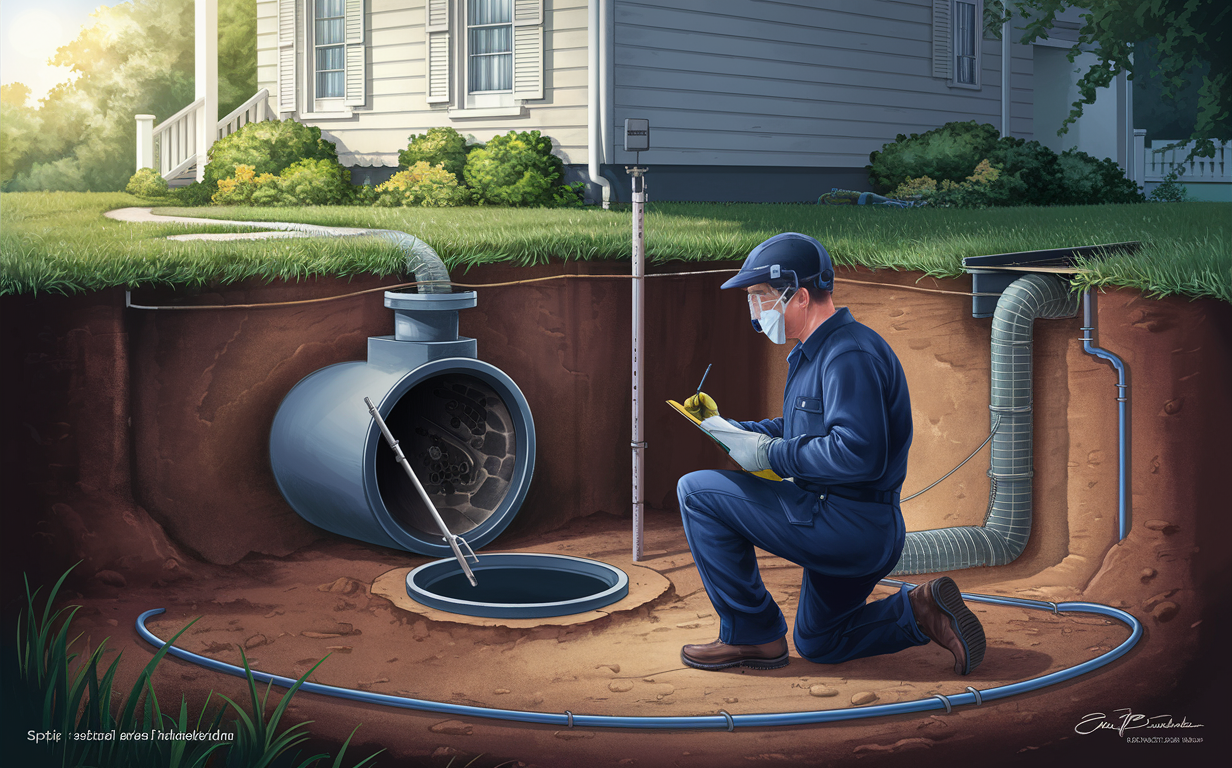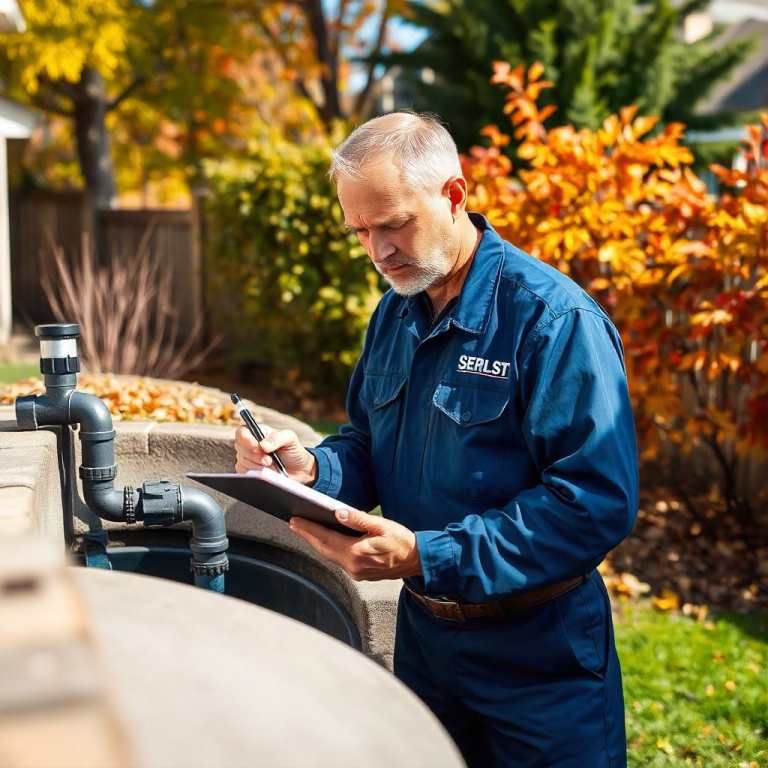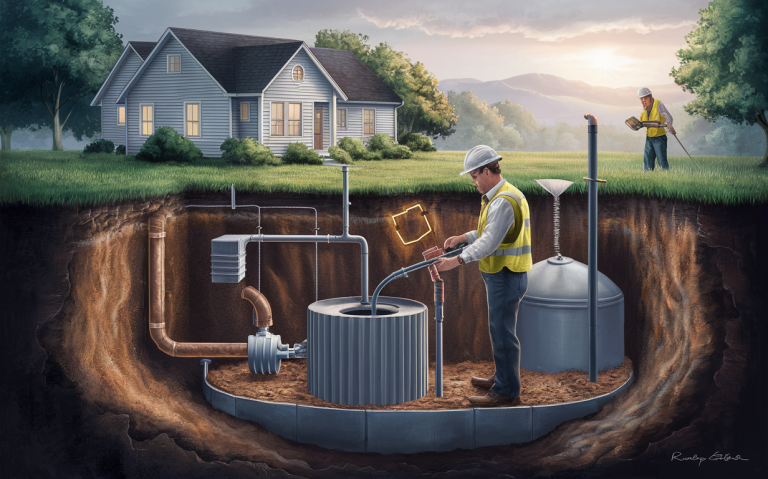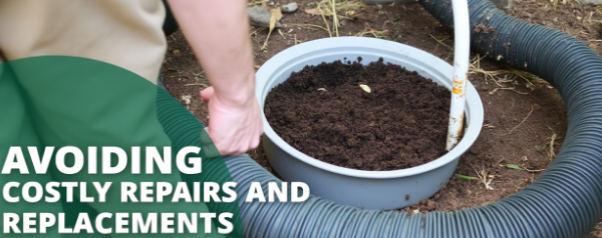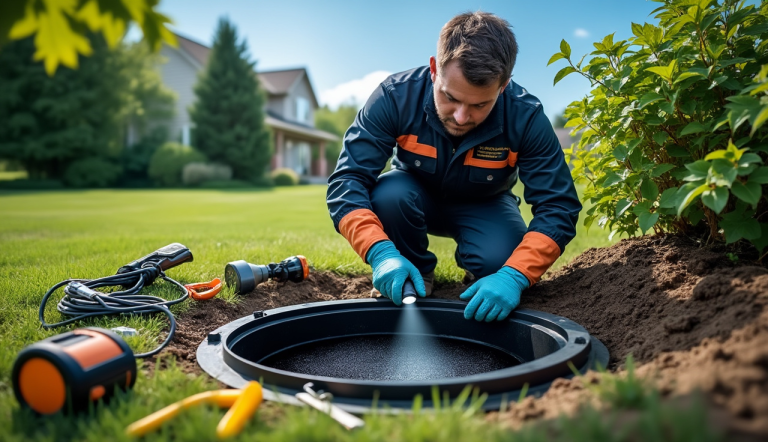When to Schedule a Septic System Inspection: Key Signs
Scheduling your septic system inspection is essential for maintaining a healthy, efficient, and long-lasting system. Regular inspections ensure that minor issues are identified and resolved before they become significant problems, saving you a lot of money and hassle in the long term.
Table of Contents
Key Takeaway
- Regular inspections: Every 3 to 5 years.
- Before buying or selling a home: Critical for real estate transactions.
- After heavy rainfall: Potential issues arising from water saturation.
- Unusual odors or slow drains: Indications of impending problems.
- High water usage events: Post large gatherings or extended homestays.
When to Schedule a Septic System Inspection Matter?
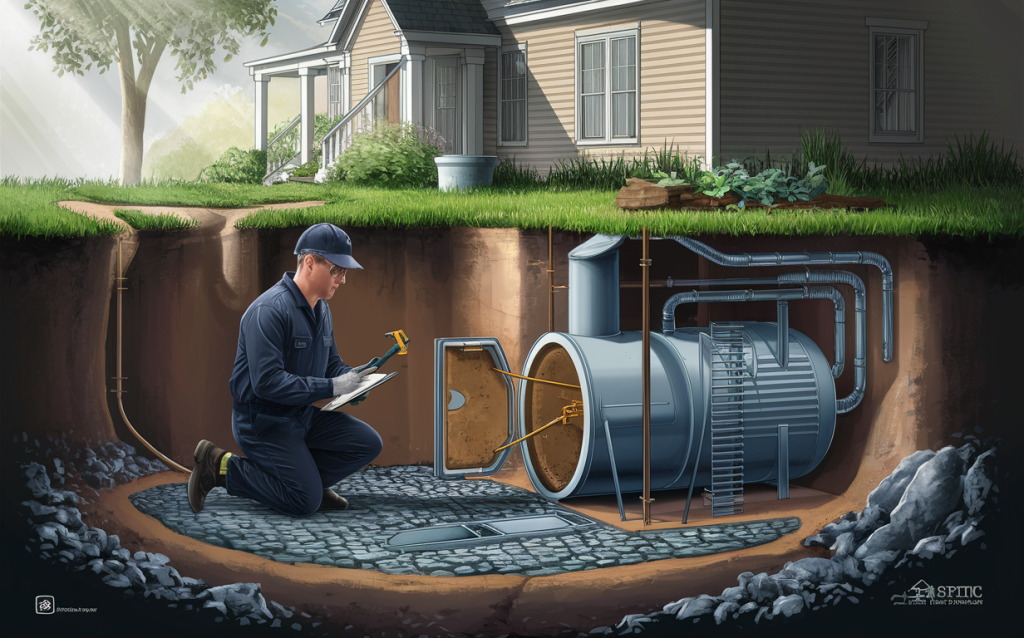
When to schedule a septic system inspection, typically every three to five years is crucial for maintaining your septic system. These inspections can identify minor issues before they escalate into costly repairs and ensure that your system functions efficiently.
Early Detection Saves Money
Catching problems early can save you thousands of dollars in repair costs. When to schedule a septic system inspection. A cracked tank or clogged leach field identified during an inspection can be addressed before it causes significant damage.
Prevent Health Hazards
A malfunctioning septic system can lead to contaminated groundwater, posing serious health risks to your family and neighbors. Regular inspections ensure that your system is functioning correctly, keeping everyone safe.
Maintain Property Value
For homeowners, a well-maintained septic system is a valuable asset. Potential buyers are likely to be more interested in a property with a documented history of regular maintenance and inspections.
Signs That You Need a Septic Inspection
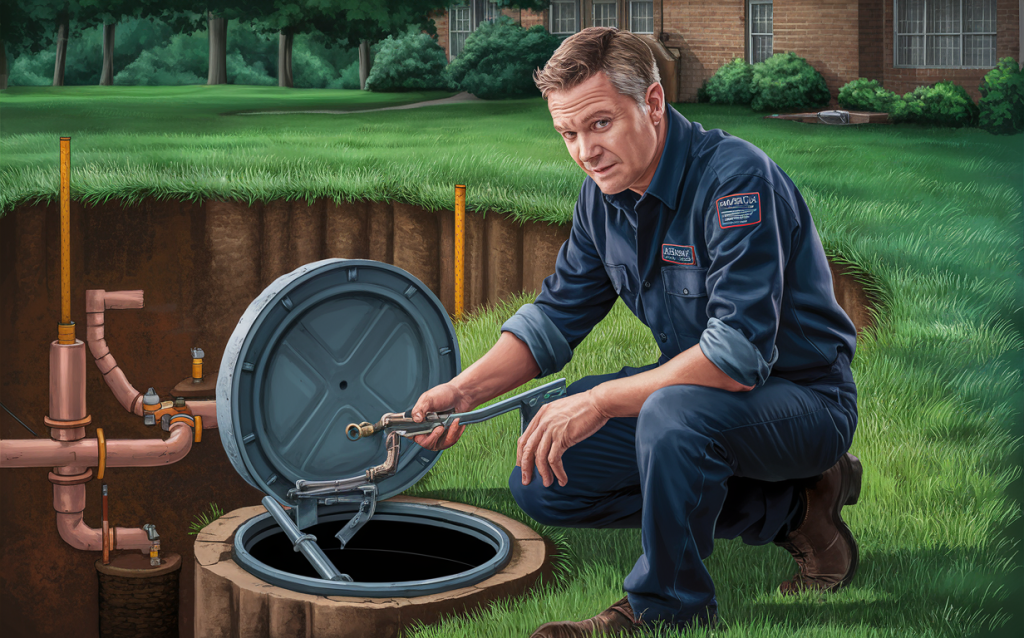
When to schedule a septic system inspection, while regular inspections are important, certain signs indicate that you need an immediate septic inspection.
Slow Drains
If your sinks, showers, and toilets are draining slower than usual, it could indicate a problem with your septic system. Slow drains often point to a clog or, in worse cases, a failing system.
Unusual Odors
Foul smells around your property, particularly near the drain field, indicate that your septic system isn’t functioning correctly. These odors are usually due to leaks or overflows and should be inspected immediately.
Pooling Water
If you notice pooling water in your yard, especially around the drain field, it could indicate that your septic system is overloaded. This pooling can lead to severe issues if not addressed promptly.
Septic System Backups
Frequent backups are a clear sign that your septic system needs an inspection. Backups can cause significant damage to your home and pose health risks.
How Often You Should Schedule Inspections
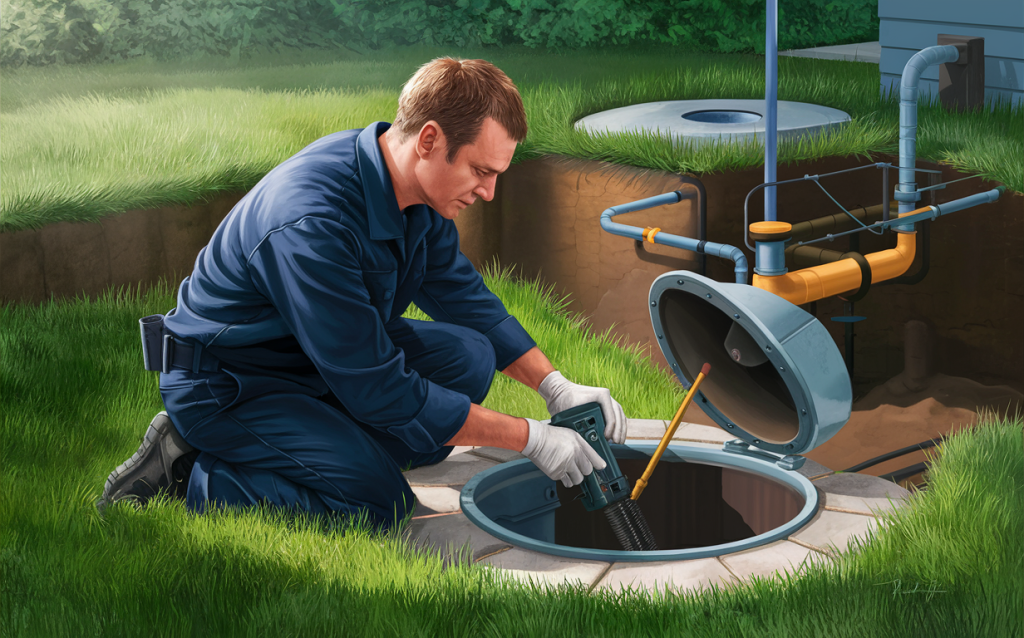
The frequency of septic system inspections depends on several factors, including the size of your tank, the number of people in your household, and your water usage habits.
Household Size
Larger households produce more wastewater, which can fill up the septic tank more quickly. If you have a large family, you may need to schedule inspections every two to three years.
Tank Size
The size of your septic tank also determines how often it should be inspected. Smaller tanks fill up faster and may require more frequent inspections.
Water Usage
High water usage can strain your septic system. If your household uses a lot of water, consider when to schedule a septic system inspection and more frequent inspections to ensure everything is functioning correctly.
| Factor | Frequency of Inspection |
|---|---|
| Small Household | Every 5 years |
| Large Household | Every 3 years |
| High Water Usage | Every 2-3 years |
| Small Tank | Every 2-3 years |
| Large Tank | Every 5 years |
The Inspection Process
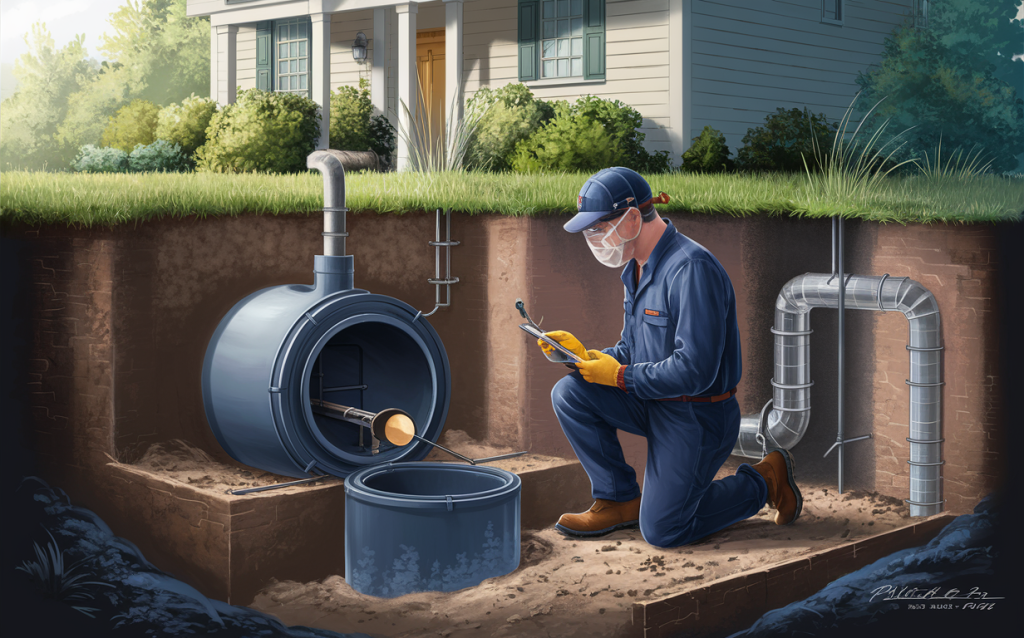
Understanding what happens during a septic system inspection can help you prepare for and when to schedule a septic system inspection for your next one.
Visual Inspection
The inspector will start with a visual inspection of your system, checking for signs of wear and damage. They will look for pooling water, odors, and other visible issues.
Tank Pumping
During the inspection, the tank may need to be pumped to check for cracks and other structural issues. Pumping also helps to reset the system, ensuring it operates efficiently.
System Components
The inspector will check all system components, including the septic tank, distribution box, and drain field. When to schedule a septic system inspection. They will look for signs of damage, clogs, and other issues that could affect the system’s performance.
Documentation
The inspector will provide a detailed report of their findings, including any necessary repairs or maintenance. This report is essential for future reference and can be helpful if you decide to sell your home.
When to Schedule an Immediate Inspection
When to Schedule a Septic System Inspection, certain situations call for an immediate septic system inspection, regardless of when your last one was.
Buying or Selling a Home
If you’re buying or selling a home with a septic system, an inspection is essential. It provides peace of mind for both parties and can help avoid any surprises down the line.
After Heavy Rainfall
Heavy rainfall can saturate the ground, affecting your septic system. If you’ve experienced significant rain, it’s a good idea to schedule an inspection to ensure everything is functioning correctly.
After High Water Usage Events
If you’ve had a large gathering or guests staying for an extended period, consider an inspection. High water usage can strain your system, and an inspection can help ensure everything is still working properly.
Experiencing Slow Drains or Backups
As mentioned earlier, slow drains and frequent backups are clear signs you need when to schedule a septic system inspection. These issues can indicate a severe problem that needs immediate attention.
Preparing for a Septic System Inspection
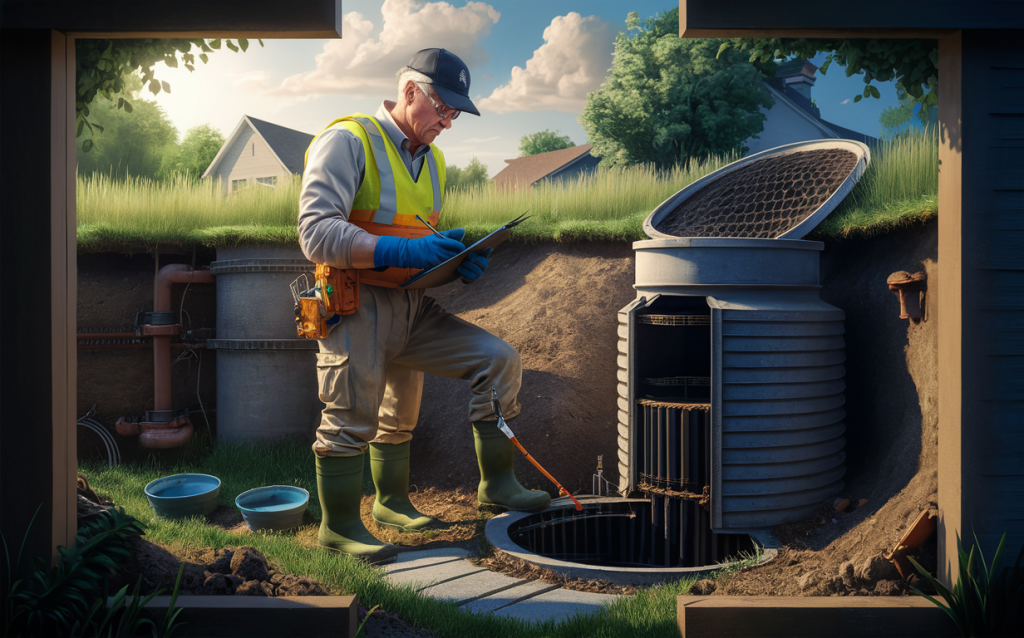
Being prepared when to schedule a septic system inspection can make the process smoother and more efficient.
Clear Access
Ensure that the inspector has clear access to all components of your septic system. This may involve clearing away any overgrown vegetation or removing obstacles.
Provide System History
Providing the inspector with a history of your system, including previous inspections and maintenance, can be helpful. This information allows the inspector to better understand your system’s condition.
Schedule During Dry Weather
Scheduling your inspection during dry weather can make it easier for the inspector to identify issues. Wet conditions can sometimes mask problems, making it harder to diagnose issues accurately.
What to Expect After a Septic Inspection
After your inspection, the inspector will provide you with a detailed report of their findings. This report will include any necessary repairs or maintenance.
Immediate Repairs
If the inspector identifies any immediate issues, it’s essential to address them as soon as possible. Delaying repairs can lead to more significant problems and higher costs down the line.
Regular Maintenance
Based on the inspection findings, the inspector may recommend a maintenance schedule. Regular maintenance, such as pumping and cleaning, can help keep your system running smoothly.
Follow-Up Inspections
The inspector may recommend follow-up inspections depending on the condition of your system. These inspections can help monitor any potential issues and ensure your system continues to function correctly.
| Issue Identified | Recommended Action | Timeframe |
|---|---|---|
| Minor Cracks | Schedule repairs | 1 month |
| Clogs | Clean and maintain | Immediate |
| Structural Damage | Major repairs or replace | 3 months |
| Overloaded System | Reduce usage, maintain | Ongoing |
Common Septic System Problems Identified During Inspections
During an inspection, several common problems may be identified. Understanding these issues can help you take preventive measures.
Clogged Pipes
Clogged pipes are a common issue that can lead to backups and slow drains. Regular maintenance, including pumping and cleaning, can help prevent clogs.
Tree Root Intrusion
Tree roots can penetrate your septic system, causing damage and clogs. Regular inspections can identify root intrusion early, allowing you to address the issue before it causes significant damage.
Leach Field Failure
A failing leach field can lead to pooling water and foul odors. Inspections can help identify leach field issues early, allowing you to take corrective action.
Tank Damage
Cracks and other damage to your septic tank can lead to leaks and contamination. Regular inspections can identify tank damage early, preventing more significant issues.
Maintaining Your Septic System Between Inspections
Regular maintenance is crucial for keeping your septic system in good working order between inspections.
Use Water Efficiently
Conserving water can help reduce the strain on your septic system. Fixing leaks, using water-saving fixtures, and spreading out laundry loads can all contribute to efficient water usage.
Avoid Harsh Chemicals
Harsh chemicals can damage your septic system and kill beneficial bacteria. Use septic-safe cleaning products and avoid pouring chemicals down the drain.
Regular Pumping
Regular pumping helps keep your septic system functioning correctly. The frequency of pumping depends on the size of your tank and household, but it’s generally recommended every three to five years.
Key Maintenance Practices
- Monitor water usage: Spread out laundry and dishwashing loads.
- Avoid flushing non-degradable items: Such as wipes and feminine hygiene products.
- Use septic-safe products: For cleaning and personal care.
- Protect your drain field: Avoid parking or planting deep-rooted plants over it.
- Inspect regularly: Keep to the recommended inspection schedule.
Importance of Professional Inspections
While some maintenance tasks can be done by homeowners, professional inspections are essential for a thorough evaluation.
Expertise
Professional inspectors have the knowledge and experience to identify issues that may not be obvious to homeowners.
Tools and Equipment
Inspectors use specialized tools and equipment, such as cameras and pumps, to thoroughly inspect your system.
Comprehensive Reports
Professional inspectors provide detailed reports of their findings, including any necessary repairs or maintenance. These reports are essential for maintaining your system and can be valuable if you decide to sell your home.
Conclusion
Regular septic system inspections are essential for maintaining a healthy and efficient system. Inspections can save you money, prevent health hazards, and maintain your property value by identifying and addressing issues early.
Schedule your inspections every three to five years, or immediately if you notice any signs of problems. Proper maintenance between inspections can also help keep your system running smoothly.
By following these guidelines, you can ensure your septic system remains in good working order, protecting your home and health. Feel free to visit our website or contact us for assistance.

